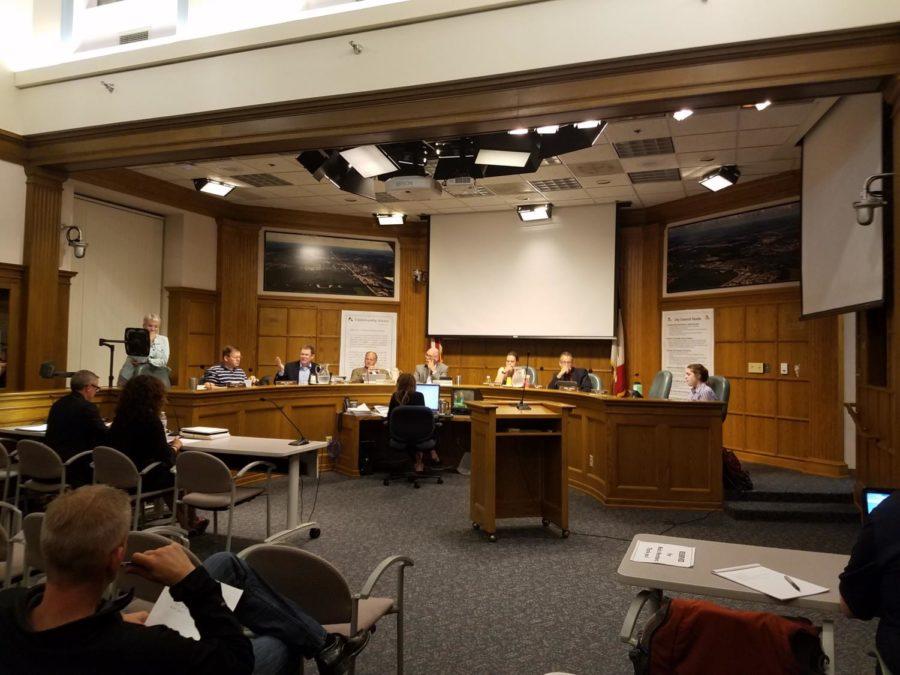- App Content
- App Content / News
- News
- News / Politics And Administration
- News / Politics And Administration / City
City council delays decision on rental exemptions
City Council discusses Rental Cap exemptions at the June 26 City Council meeting. At-Large representative Amber Corrieri is not present but can speak and vote over the speaker system.
August 14, 2018
After a veto by Mayor John Haila earlier this month, the Ames City Council has pushed back their reconsideration of the controversial rental cap exemptions.
The city council will revisit the ordinance at its Aug. 28 meeting, yet addressed specific sections Tuesday night that Haila and others on the council perceived as troublesome.
Haila vetoed the bill last week — the first veto by an Ames mayor in 29 years — forcing the council to revisit the ordinance they have been discussing since May.
The first change, passed 5-1, was focused on the bona fide rental language added at previous council meeting that allows for roomers, single-room renters who also family members, to allow a property owner to receive a Letter of Compliance — the document required to rent a property.
With the new change, the exemption will only apply to one- and two-bedroom homes.
This section was the main reason Haila had refused to sign the ordinance originally because he felt the language was “inconsistent” with the council’s goals.
In a statement from the City of Ames, Haila vetoed the rental cap exemptions when the definition of bona fide was expanded to include “an owner-occupied dwelling with a non-owner occupant who pays rent.”
“I believe that the spirit and principle of what Council has worked on for months was compromised,” Haila said in the statement.”
Under this change, a property with three or more bedrooms would not be able to keep their Letter of Compliance if the property owner lives in their home while also having a roomer.
Ames City Council staff said that the change would close some of the loopholes associated with the previous language. More specifically, it would prevent a family from claiming they rent a room to one of their adult children and keep a Letter of Compliance indefinitely.
The sole vote against the motion was Ward One Representative Gloria Betcher.
“Even one property is more than zero,” Betcher said. “Those are more houses we have to reclaim over the course of the ordinance if we want to return the rental percentage to 25 percent.”
Ward Four Representative Tim Gartin said the changes would still reduce the number of houses eligible as it would apply almost exclusively to two-bedroom homes.
“There aren’t a whole lot of houses that are one bedroom,” Gartin said.
However, Haila was unsure if the change would “substantively” make a difference.
“It is the principle I am trying to get at, and that is [the] council voted to place a cap in the neighborhoods at 25 percent,” Haila said. “I continue to believe that we are eroding or diluting that ordinance that was passed not too long ago.”
Haila said the original definition of a bona fide rental was any property with two or more renters and questioned whether the change would make a difference.
The second change was to the deadline dates in the ordinance. Sept. 1 was the original deadline for property owners to apply for some of the rental cap exemptions, but City of Ames lawyer Mark Lambert said people would only have two days to apply if the ordinance passes on Aug. 28.
Council changed the ordinance language to say the application for a Letter of Compliance has to be submitted within 30 days after the enactment of the ordinance.
After a property owner’s application is filed and an inspection by the city has been completed, they will be given six months to bring the property in compliance with renting code. To keep their Letter of Compliance, property owners must then prove the property is being used for rent within 12 months following their approval.
Gartin said he was confident they could pass this ordinance, but was surprised there weren’t many changes made at the meeting. He said if no one else had any issues to bring up, he would assume what was discussed would be the main concerns moving forward.
The veto will take four votes to overturn — the same number it passed with originally.







